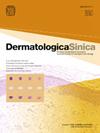无膜干细胞成分可改善2,4-二硝基氯苯诱导的NC/Nga小鼠的特应性皮炎
IF 2.2
4区 医学
Q2 DERMATOLOGY
引用次数: 0
摘要
特应性皮炎(AD)是一种普遍存在的炎症性皮肤病,其特点是皮肤屏障功能障碍、胸腺基质淋巴细胞生成素(TSLP)产生和Th1/Th2免疫反应失衡。虽然许多研究都探讨了脂肪源性干细胞(ADSC)在修复和再生AD引起的受损皮肤组织方面的治疗潜力,但从ADSC提取物中提取的无膜干细胞成分(ADSCE)对AD的影响尚未得到研究。 本研究旨在探讨ADSCE对小鼠AD的缓解作用,并验证ADSCE对AD的治疗应用。 通过在 NC/Nga 小鼠背侧皮肤上施用 2,4- 二硝基氯苯(DNCB)诱导 AD 样损伤。然后皮下注射 ADSCE,连续 3 周。测量皮炎评分、表皮厚度、经表皮失水(TEWL)和血清免疫球蛋白 E(IgE)水平。皮肤屏障蛋白和炎症细胞因子的表达则通过 Western 印迹法和定量实时聚合酶链反应法进行了测定。 通过改善皮炎评分、表皮厚度、TEWL 和血液中 IgE 的总水平,可以看出服用 ADSCE 能明显改善多种皮肤病。ADSCE 治疗可导致各种皮肤屏障蛋白的表达上调,其中包括内卷蛋白、洛里克林蛋白、闭塞蛋白和闭塞带-1。此外,ADSCE 还能抑制肥大细胞的浸润和 TSLP 的表达。ADSCE 还降低了炎性细胞因子的表达,包括肿瘤坏死因子-α、白细胞介素(IL)-1 β、IL-4 和诱导型一氧化氮合酶。 使用 ADSCE 可增强小鼠皮肤特征,并对 AD 类病变发挥抗炎作用。本文章由计算机程序翻译,如有差异,请以英文原文为准。
Membrane-free stem cell components ameliorate atopic dermatitis in 2,4-dinitrochlorobenzene-induced NC/Nga mice
Atopic dermatitis (AD) is a prevalent inflammatory skin disorder characterized by skin barrier dysfunction, thymic stromal lymphopoietin (TSLP) production and an imbalance in the Th1/Th2 immune response. While numerous studies have examined the therapeutic potential of adipose-derived stem cells (ADSC) in repairing and regenerating damaged skin tissues caused by AD, the effects of membrane-free stem cell components derived from ADSC extract (ADSCE) on AD have not been investigated.
The objective of this study was to investigate the alleviating effects of ADSCE on AD in mice and validate the therapeutic application of ADSCE on AD.
An AD-like lesion was induced by the administration of 2,4-dinitrochlorobenzene (DNCB) on the dorsal skin of NC/Nga mice. Then, ADSCE was administered subcutaneously for 3 weeks. Dermatitis score, epidermal thickness, transepidermal water loss (TEWL), and serum levels of immunoglobulin E (IgE) were measured. Expression of the skin barrier proteins and inflammatory cytokines were measured by western blotting and quantitative real-time polymerase chain reaction.
The administration of ADSCE demonstrated a significant amelioration in several skin diseases, as indicated by improvements in dermatitis score, epidermal thickness, TEWL, and total blood levels of IgE. ADSCE treatment led to an upregulation in the expression of various skin barrier proteins, including involucrin, loricrin, occludin, and zonula occludens-1. In addition, ADSCE inhibited the infiltration of mast cells and the expression of TSLP. Expression of inflammatory cytokines, including tumor necrosis factor-α, interleukin (IL)-1 β, IL-4, and inducible nitric oxide synthase, was also lowered by ADSCE.
The use of ADSCE resulted in enhanced skin features and exerted anti-inflammatory properties on AD-like lesions in mice.
求助全文
通过发布文献求助,成功后即可免费获取论文全文。
去求助
来源期刊

Dermatologica Sinica
DERMATOLOGY-
CiteScore
2.80
自引率
20.00%
发文量
28
审稿时长
>12 weeks
期刊介绍:
Dermatologica Sinica aims to publish high quality scientific research in the field of dermatology, with the goal of promoting and disseminating dermatological-related medical science knowledge to improve global health. Articles on clinical, laboratory, educational, and social research in dermatology and other related fields that are of interest to the medical profession are eligible for consideration. Review articles, original articles, brief reports, case reports and correspondence are accepted.
 求助内容:
求助内容: 应助结果提醒方式:
应助结果提醒方式:


